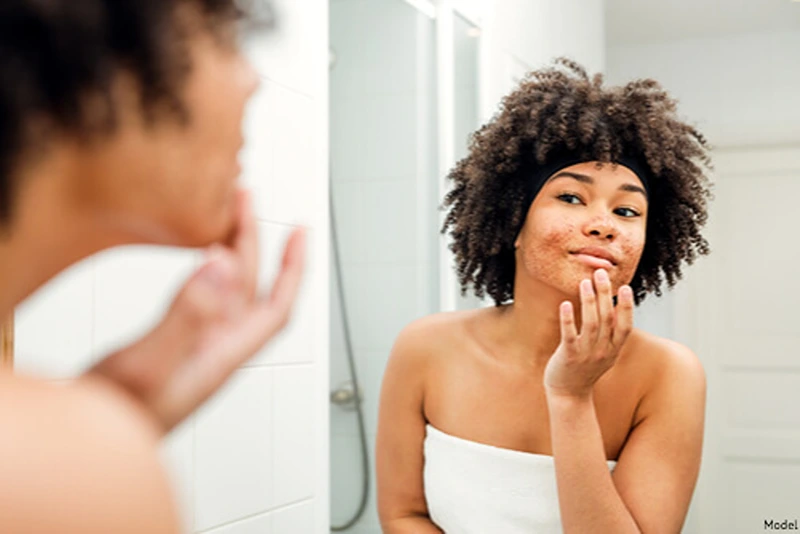How Can I Reduce My Acne? Kansas City, MO

We often think of acne as a bothersome part of our teenage years, but for many, acne follows us into adulthood and can be caused — or worsened — by a range of factors. My passion is to help you achieve healthy, glowing skin no matter your age or skin type, which is why I’ve compiled these 10 steps to help you reduce or eliminate persistent acne!
First, I want to make sure you know all about our newly launched aNū MD product line! Not just because these products are specially designed to provide the highest quality care and results, but because this month, when you spend $350 on aNū MD skincare, you can choose one of the following aNū MD products for FREE:
• Soothing Cleanser
• Gentle Exfoliating Cleanser
• Clarifying Acne Cleanser
• Smoothing Scrub
• Cooling Mint Mask

Each product was personally developed and designed by me, and I can’t wait for you to try them! With aNū MD products and these daily tips, you can experience long term acne relief:
1. Avoid eating or drinking milk and dairy products. When we digest whey and casein, the proteins found in cow’s milk, they release a hormone similar to insulin, which has been shown to trigger breakouts. Sometimes these hormones can also interact with our own hormones, which can confuse our body’s endocrine system and cause breakouts.
2. Do your best to maintain a diet with a low glycemic load and low levels of sugar, AKA avoid eating or drinking sugar and wheat. Sugar, liquid calories and flour products all increase insulin and testosterone in your body and may cause breakouts.
3. Strive to eat an anti-inflammatory diet full of fruits and vegetables. People who eat more
vegetables (containing more antioxidants and anti-inflammatory compounds) have less acne. Try your best to get your five to nine servings of colorful fruits and vegetables every day. Leafy greens are loaded with folate and magnesium – if you’re not a big fan of salads, throw them into a fruity smoothie!
4. Include more healthy, anti-inflammatory fats in your diet — especially omega-3 fats (fish oil) and anti-inflammatory omega-6 fats. Most people need supplements to get adequate amounts.
5. Include foods that have been linked to improvements in many of the underlying causes of acne, meaning they can help correct it. These include fish oil, turmeric, ginger, green tea (ECGCs), nuts, dark purple and red foods such as berries, green foods like dark green leafy vegetables, and omega-3-rich foods, like fish or enriched eggs.
6. Make acne-fighting supplements part of your daily routine. Some of these are critical for skin health. Antioxidant levels have been shown to be low in those struggling with acne. Healthy fats can make a big difference!
● Omega (EPA/DHA): 1,500-2,000 mg daily
● Zinc citrate: 30-50 mg daily
● Vitamin A: 25,000-50,000 IU daily for two months. (Do not do this if you are pregnant.) This dose is too high for long term use but may be used for short periods to clear skin.
● Vitamin E (mixed tocopherols, not alpha tocopherol): 400 IU daily.
7. Heal the gut! Probiotics (lactobacillus, bifidobacteria) can improve acne by helping reduce inflammation in the gut that may be linked to acne. We carry several product options at aNū that are science-based and MD approved! Avoid eating foods you are sensitive to. Delayed food allergies are among the most common causes of acne — foods like gluten, dairy, yeast, nuts and eggs are common culprits and can be a problem if you have a leaky gut. Dr. Watkins or a nurse practitioner can test you to see what foods you might be reacting to. With gluten, for example: Many people go for years without knowing the connection between gluten and their skin disorders. I have seen remarkable improvement in many patient’s illnesses, especially skin disorders and autoimmune disease, when they make the change to a grain-free diet.
8. Get great sleep. Studies show that sleep loss contributes to inflammation, which feeds the flames of acne and numerous other issues. Those are among the many reasons you want to aim for seven to nine hours of solid, uninterrupted sleep every night.
9. Exercise regularly. Among countless other benefits, exercise helps improve insulin function, reduces inflammation and boosts self-confidence.
10. Aim to stress less. Chronic stress causes acne flare-ups by increasing inflammation and oxidative stress, raising cortisol and depleting zinc, magnesium and selenium, which help control acne. Stress can also contribute to poor dietary choices. Everyone manages stress differently, but some common relaxation and de-stressing methods include meditation, yoga, saunas, massage, biofeedback, aromatherapy and more. Relaxing is anti-inflammatory!
Remember that reducing or eliminating acne requires inside and outside changes. Acne is not something that can be cured, but it can be strictly managed with lifestyle changes, daily skincare and monthly office treatments, if you’re able.
Making dietary changes and including daily vitamins and supplements can help eliminate the root cause of the inflammation that causes acne.
Daily skincare and recurring skin treatments will reduce the inflammation of acne. I recommend:
● Monthly HydraFacial® or Diamond Glow™
● Two to three chemical peels per year
● Daily acne skin care products including aNū MD Clarifying Acne Wash, Acne Control Serum, Exfoliating Acne Pads, and two to three times per week Pore Perfecting Charcoal Mask

For acne scars and inflammation, I recommend a series of at least three microneedling or Morpheus8 radiofrequency resurfacing treatments, and dermal fillers can also help to plump skin and reduce the appearance of acne scars.
If you are still struggling with acne and gut issues or want more answers, please call 816.359.3310 or request a consultation online to ask our staff about functional medicine options and for information on how to become a wellness patient of Dr. Watkins (all ages) or our nurse practitioners (18 and over).